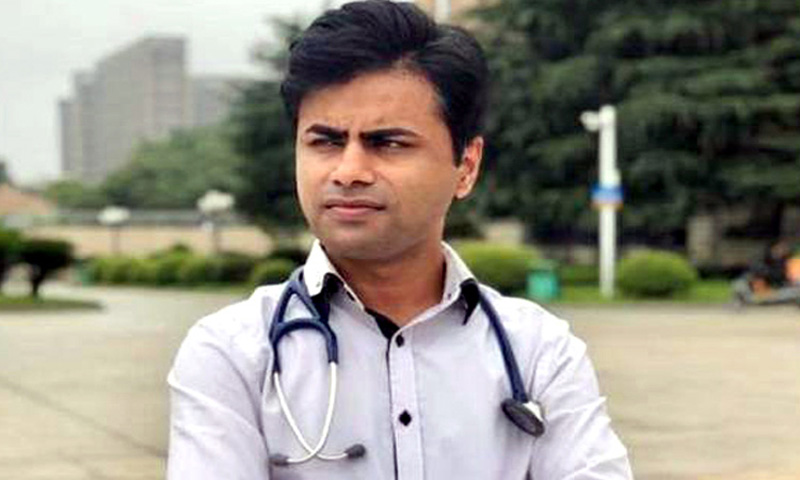 As the world confronts a huge challenge in the shape of coronavirus pandemic, Pakistanis living in several countries have risen to the occasion and are doing a commendable job while fighting on the frontline to save precious lives.
As the world confronts a huge challenge in the shape of coronavirus pandemic, Pakistanis living in several countries have risen to the occasion and are doing a commendable job while fighting on the frontline to save precious lives.
The pandemic originated from Wuhan city of China in last December and a Pakistani doctor teaching at a university in the epidemic area wasted no time to volunteer to treat coronavirus patients. Dr Usman, a teacher at Changsha Medical College, was the first foreign doctor who stepped forward to treat infected people in Wuhan as a volunteer, even risking his own life
Usman, 29, graduated from Hunan University of Traditional Chinese Medicine with a bachelor’s degree in 2012 and returned to Pakistan to practice medicine. In 2016, he returned to China and began studying for a master’s degree in medicine at Central South University in Changsha. After graduation, he became a foreign teacher at Changsha Medical College. On January 27, Usman, originally from Jhelum city of Punjab, formally applied to the Foreign Experts Service Office of Hunan Science and Technology Department to go to the Wuhan epidemic area for medical assistance. He request was accepted and he worked tirelessly along with Chinese doctors to serve the humanity. Branded as a hero by Chinese media, Dr Usman has bagged huge appreciation not only from the Pakistani community residing in China but also the Chinese government.
Dr Habib Zaidi, a 76-year-old Pakistani general physician in Essex, United Kingdom, even sacrificed his life while serving the community. He died while being treated for what was probably coronavirus at Essex’s Southend Hospital, what was said to be the first coronavirus-related death of a doctor in the United Kingdom.
Dr Habib Zaidi worked as a GP in Leigh-on-Sea for more than 45 years. His four children are also medical professionals, with their son working as a hematologist consultant in London and daughters working as a trainee surgeon, a dentist and a GP. In a statement, the family described Dr Zaidi as a beloved pillar of his community. “For that to be the thing that took him is too much to bear. It is reflective of his sacrifice. He had a vocational attitude to service,” his daughter said.
In Barcelona, Spain, Sheraz Syed, along with 195 other Pakistanis, provides free rides to healthcare staff in the city. The initiative started at the beginning of Spain’s lockdown, in mid-March, as six Pakistani taxi drivers led by Shahbaz Ahmed discussed how medical workers would be able to return at night to their homes. Since then, their effort has expanded to about 200 volunteers. They started by sharing their contact details with hospitals and organised their schedules to cover the city centre and more remote facilities.
In addition to the taxi drivers’ inititative, over the past two weeks, the local Pakistani community has also stepped in to help. Grocery store owners have converted industrial warehouses into spaces taxi drivers can use to organise food parcel distribution to the homeless and families in need. Hundreds of masks and robes for medical workers are being sewn together at pace at the Catalan Islamic Cultural Centre.
While the Covid-19 pandemic has shattered human confidence besides encouraging ‘personal-safety-first’ approach, the Pakistani-American community has exceptionally rose to the challenge and is fighting as a frontline force in protecting the lives of its compatriots as well as non-Pakistanis in the United States (US). The community is fearlessly engaged in relief activities in the world’s hardest-hit country and its campaign’s major target is the New York City, where majority of fatalities have been reported by the US authorities. The American Pakistani Advocacy Group (APAG) was the first South Asian organization in US which launched a major initiative to help those people who were in need, delivering ration and other essential items at the door steps of those people who were unable to visit grocery shops due to lockdowns in various cities of the US. Another initiative was meant to offer free lunch to those Americans who were at the forefront in the fight against the coronavirus
Pervaiz Riaz, a businessman from the US, gave free disinfection services to the doctors, nurses and other frontline fighters. Mazhar Chughtai, an entrepreneur by profession, in collaboration with the US-based Pakistani organizations distributed food among thousands of families. Moviz Saddique from Islamic Circle of North America (ICNA) distributed food and safety kits in 145 cities of the US. Hundreds of volunteers are currently working across US which also includes a large number of Pakistani women. US Principal Deputy Assistant Secretary of State for South and Central Asian Affairs Alice Wells has also lauded the Pakistani Americans for serving the communities in the US and Pakistan.
Pakistani diaspora in Singapore also came forward to help their home country, sending thousands of protective kits, goggles and face masks to support the government in its efforts against coronavirus.
Generosity has a lot to do with religious beliefs and Pakistanis donate huge sums of money and efforts in different forms to those in need, especially in the time of a disaster or calamity. The selfless efforts of the Pakistani diaspora during the coronavirus pandemic have not only helped improve the image of country but also helped ensure their own safety and prestige in their relevant countries of stay. With such initiatives, they are definitely changing the narrative about Pakistan and showing that what actually Pakistani community is and what they can do for the humanity.